The expansive swimming venue of the Tokyo 2020 Olympics felt different than past Olympic venues. The stands were filled to half-capacity and had no foreign spectators due to the ongoing COVID-19 pandemic.
In London and Rio, cameras would pan to athletes’ parents watching swims anxiously and tearing up when their children won medals. This year, the stands were occupied most noticeably by scattered groups of swimmers on one side and domestic spectators on the other.
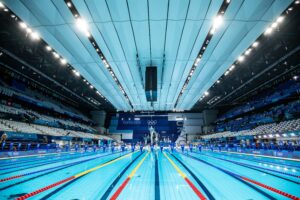
Tokyo Pool Stock (photo: Jack Spitser)
People brought horns and drums to offset the void, and athletes brought their own energy.
At 10:30 a.m. Sunday morning in Tokyo, the first finals session of the 2020 Olympics began.
When the men’s 400 freestyle came, Australians Elijah Winnington and Jack McLoughlin were the favorites and were ranked 1-2 in the world at the time. Lane 4 belonged to Germany’s Henning Bennet Muhlleitner who swam the fastest time in prelims. Jake Mitchell, the American who made a name for himself by qualifying for the Olympic Team during a solo time trial, was also in the mix.
But no one expected much of 18-year-old Ahmed Hafnaoui of Tunisia, who had to swim a lifetime best time to earn the eighth spot in the final.
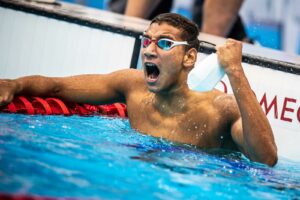
Ahmed Hafnaoui (courtesy of Jack Spitser)
Swimming out of lane 8, the Tunisian teenager was in second place with 100 meters to go. “I just can’t imagine this guy could be able to hold on an entire 400 meters,” NBC commentator and three-time Olympic gold medalist Rowdy Gaines said.
But he did. Hafnaoui turned on the gas on the last length, surpassing McLoughlin and out-touching him by .16 for gold in an epic finish.
With that, alongside reigning world champion Daiya Seto missing the 400 IM final, the world knew this Olympics was going to be electric and nothing was certain.
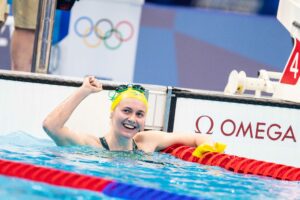
Ariarne Titmus (photo: Jack Spitser)
On the same day, Australia’s Bronte Campbell, Meg Harris, Emma McKeon and Cate Campbell clocked the first world record of the meet in the 4×100 free relay.
Day 2 witnessed a highly anticipated battle between World Record holder Katie Ledecky of Team USA and Australia’s Ariarne Titmus in the 400 freestyle final. The Australian “Terminator” handed Ledecky her first individual Olympic defeat by charging on the last 50 meters.

Kaylee McKeown (photo: Jack Spitser)
On day 3, Kaylee McKeown continued this chain of “firsts,” becoming the first Australian woman in history to win gold in the 100 backstroke.
Russia’s Evgeny Rylov broke the Americans’ historic win streak that spanned six consecutive Olympic Games in the 100 back. His countrymate Kliment Kolesnikov snagged second place, making this one of five times Americans have not placed first or second in the event in Olympic history.
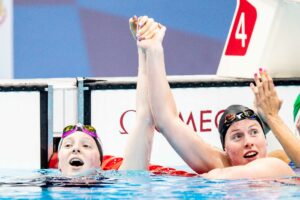
Lydia Jacoby and Lilly King, left to right (photo: Jack Spitser)
In the span of less than two months, Lydia Jacoby went from becoming Alaska’s first Olympic swimmer to Alaska’s first Olympic gold medalist in swimming (and third-ever gold medalist) by winning the 100 breaststroke. The 17-year-old beat a field that included two breaststroke world record holders (Lilly King and Tatjana Schoenmaker.)
Yui Ohashi won gold in the 200 IM final on day 4, effectively sweeping the IM’s for Japan. She had won the first gold medal of the meet for the host country on day 1 in the 400 IM and out-touched silver medalist Alex Walsh by .13 to win gold in the 200 IM.
USA’s Ledecky and Erica Sullivan finished 1-2 in the first-ever women’s Olympic 1500 free final. Ledecky had a tough 200 free / 1500 free double that session, finishing fifth in the 200 free final.
With less than an hour between that swim and her 1500, she was seen refueling with chocolate milk, Powerade, and munching on a banana from inside the warmup pool.
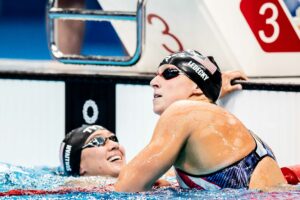
Erica Sullivan and Katie Ledecky, left to righ (photo: Jack Spitser)

Katie Ledecky (photo: Jack Spitser)
Whatever she did, it worked. And after completing the feat, we saw something we don’t normally see: tears from Ledecky.
On day 5, Bobby Finke turned the 800 freestyle into a 50 free sprint. He was in fifth place going into the last 50 meters and was barely within the camera frame. But he charged down the pool in 26.39 to lower his American Record and become the first American man to win a distance event at the Olympics since 1984.
Zhang Yufei started the session with a legendary 200 fly. She dominated the race from the start and finished 1.4 seconds ahead of the field to break a 9-year-old Olympic Record and post the fastest 200 fly time in 12 years.
Four events later, Yufei went virtually straight from the 200 fly medal ceremony to the blocks to swim on China’s 4×200 free relay. The team of Yang Junxuan, Tang Muhan, Yufei, and Li Bingjie pushed the field so fast that the entire podium cracked Australia’s World Record from 2019.
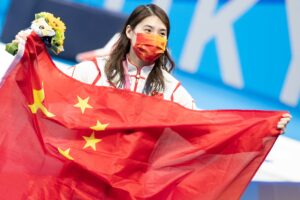
Zhang Yufei (photo: Jack Spitser)
China won gold and set a blistering world record time of 7:40.33. Yufei finished the session with two gold medals and two Olympic records.
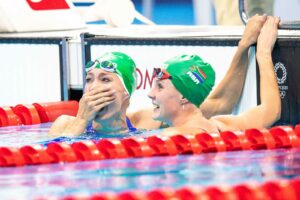
Tatjana Schoenmaker – courtesy of Jack Spitser
Another world record was shattered on day 6 when Tatjana Schoenmaker cracked the 200 breaststroke record by .16 to win gold. King had the initial lead but South Africa’s Shoenmaker took over at the halfway point and finished nearly a full second ahead of everyone to top the podium.
This was a stark contrast to South Africa’s performance at the 2016 Rio Olympics where it had no female pool swimmers.
Rylov dealt the final blow to the American men’s 100 and 200 back Olympic win streak by claiming gold in the 200 back, again becoming the first non-American to win it in the past six Olympic Games.
Australia’s Emma McKeon clocked a 51.96 to become the second woman in history to break 52.00 in 100 free. She won gold by one-third of a second.
China’s Wang Shun won the 200 IM after an epic battle with Great Britain’s Duncan Scott who claimed silver. Shun, who won bronze in 2016, set a new Asian record. The event also saw Daiya Seto make a comeback. He placed fourth and came within .05 of the podium.

Caeleb Dressel (photo: Jack Spitser)
On day 7, Caeleb Dressel dueled Hungary’s Kristof Milak in the 100 fly. Dressel, who is famous for his rocket-like start, was .65 ahead of everyone at the halfway point. But Milak closed in on him ravenously in 26.03 compared to Dressel’s 26.45 on the final 50 meters.
Dressel fended him off by .23 to win gold and break his world record by .05. Milak’s time set the European record and earned him silver.

Kaylee McKeown and Emily Seebohm (photo: Jack Spitser)
Twenty-year-old McKeown earned a monopoly on the women’s backstroke events, winning the 200 back by chasing down Canada’s Kylie Masse on the final 50. She became Australia’s first female gold medalist in this event. Her Australian teammate, four-time Olympian Emily Seebohm (who won bronze) presented McKeown with the gold.
The women’s 800 free final was a rematch between Ledecky and Titmus. Ledecky charged hard, leading the pack from start to end. But Titmus stayed on her hip the entire race and was pushed to swim a lifetime best time by nearly two seconds to keep up.
Ledecky’s gold medal finish made her the third woman ever to win any pool swimming event for three consecutive Olympics.
Great Britain’s quartet of Kathleen Dawson, Adam Peaty, James Guy, and Anna Hopkin ended the session with a mixed 4×100 medley relay world record. They nearly crushed the previous record, set by China in 2020, by a full second.
Day 8: Finke does it again. At this point, people should have seen what Bobby Finke was going to do in the 1500 free final coming. But they didn’t.
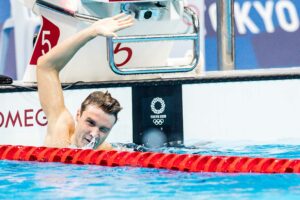
Bobby Finke (photo: Jack Spitser)
Finke and Mykhailo Romanchuk stayed close to pack-leader Florian Wellbrock for most of the race but they pushed past him on the last 50 meters.
Finke split an unbelievable 25.78 on the final length to win gold. (No, seriously. When Finke was told this during his post-race interview, his eyes grew wide in astonishment.) For context, that time beats all non-leadoff splits in the men’s 200 free final.
Sweden’s Sarah Sjostrom completed an epic comeback story by making the podium in the 50 free final and winning silver. She broke her elbow back in February, less than 200 days before the start of the Tokyo Olympics.
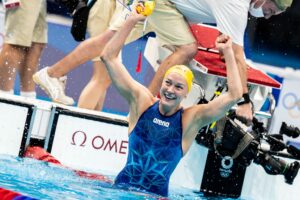
Sarah Sjostrom (photo: Jack Spitser)
Sjostrom underwent surgery which embedded screws and a metal plate in her elbow and was out of the water for three weeks. She wasn’t even able to train butterfly until early June.
Sjostrom finished 14th in this event at the 2012 Olympics and 13th at the 2016 Olympics, making her silver medal here even more impressive.
To end the Tokyo Olympic Games, USA’s Ryan Murphy, Michael Andrew, Dressel, and Zach Apple broke the first long course men’s relay world record since FINA banned the buoyant, full-body “super-suits” in 2010.
Dressel split a 49.0 on the butterfly leg of this 4×100 medley relay, the fastest split in history. He out-split 2010 super-suited Michael Phelps by .69 while Andrew out-split Eric Shanteau’s 100 breast leg by .08 to lead the team to victory.

Caeleb Dressel Zach Apple Ryan Murphy Michael Andrew USA Relay (photo: Jack Spitser)
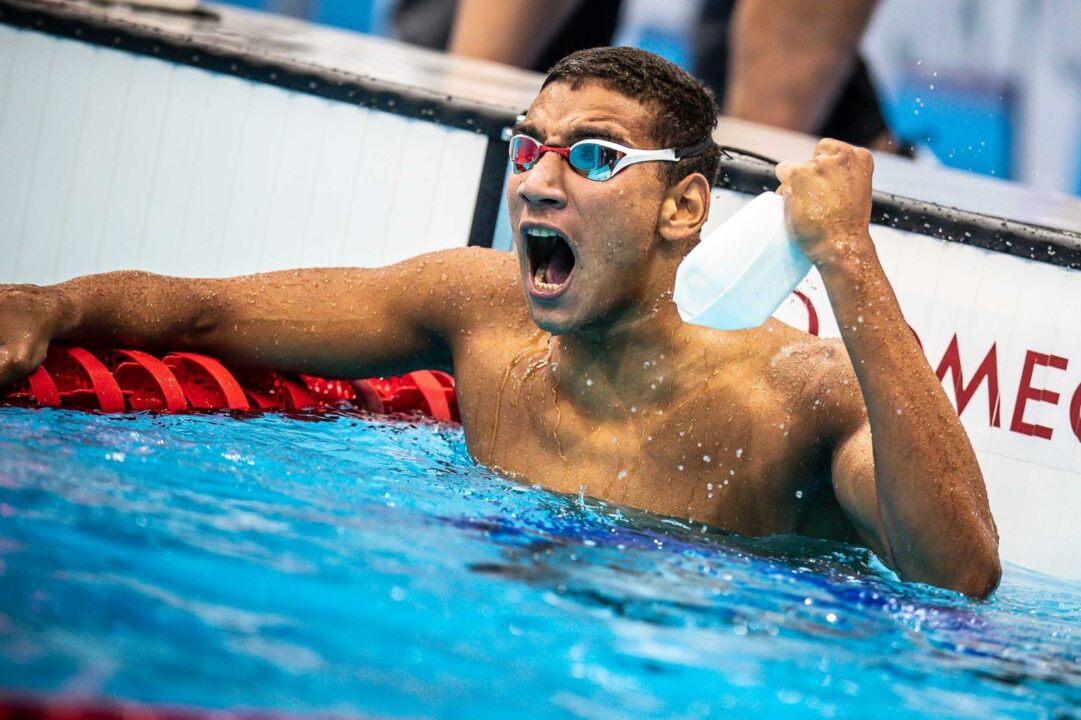
I miss summer…….
…..and Nathan Adrian……..
Cool summary, I thought the men’s 100 free would be here too though, I think it was the fastest final ever or something, and Chalmers really gave us a show
How about Emma McKeon having to anchor Australia’s mixed medley about 6 minutes after setting an OR in the semis of the 50 free? That was nuts.
Only two years and nine months to the next Olympic Trials!!
Nice article!